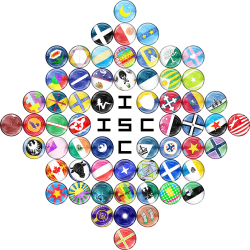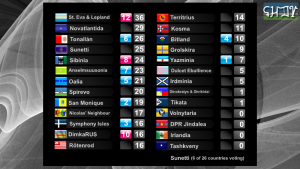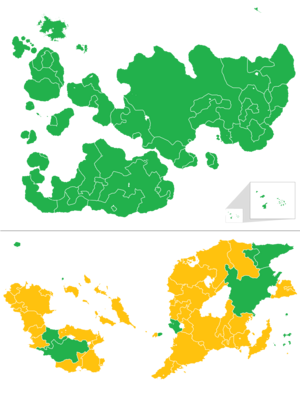Internatia Song Contest
| Internatia Song Contest | |
|---|---|
 Official logo of Internatia Song Contest since 12th edition | |
| Genre | Song contest |
| Country of origin | List of countries |
| Language(s) | English |
| Production | |
| Location(s) | List of host cities |
| Running time | 3 hours |
| Production company(s) | IBU |
| Distributor | Internatia |
| Broadcast | |
| Picture format | 1080i (HDTV) |
| Original run | 4 December 2011 – present |
| Chronology | |
| Related shows | Internatia Second Chance Contest Junior Internatia Song Contest |
| External links | |
| Official website | |
The Internatia Song Contest is a monthly singing competition held among many of the active member countries of the Internatia Broadcasting Union (IBU).
Each member country submits a song to be performed on live television and radio and then casts votes for the other countries' songs to determine the most popular song in the competition. The Contest has been broadcast every edition since its inauguration in 2011. It is also one of the most watched non-sporting events in the Internatia.
Origins
The contest was based on the Eurovision Song Contest. The first Contest was held in the town of Sansails, Spirevo, on 4 December 2011. Eight countries participated — each submitting one songs. This was the only Contest in which less than ten song was performed: since 2nd edition all Contests have more than 18 participants. The 1st Contest was won by Territrius.
Format
The format of the Contest has changed over the editions, though the basic tenets have always been thus: participant countries submit songs, which are performed live in a television programme transmitted across the Internatia Network by the IBU simultaneously to all countries. A "country" as a participant is represented by one television broadcaster from that country: typically, but not always, that country's national public broadcasting organisation. The programme is hosted by one of the participant countries, and the transmission is sent from the auditorium in the host city. During this programme, after all the songs have been performed, the countries then proceed to cast votes for the other countries' songs: nations are not allowed to vote for their own song. At the end of the programme, the winner is declared as the song with the most points. The winner receives, simply, the prestige of having won, and the winning country is invited to host the second next edition.
The programme is invariably opened by one or more presenters, welcoming viewers to the show. Most host countries choose to capitalise on the opportunity afforded them by hosting a programme with such a wide-ranging international audience, and it is common to see the presentation interspersed with video footage of scenes from the host nation, as if advertising for tourism. Between the songs and the announcement of the voting, an interval act is performed. These acts can be any form of entertainment imaginable.
As national broadcasters join and leave the IBU feed, the IBU/Internatia logo is displayed.
Participants
Eligible participants include Active Members (as opposed to Associate Members) of the IBU. Active members are those who are located in states that fall within the Internatia Broadcasting Area, or are member states of the Council of Internatia.
Active members include broadcasting organisations whose transmissions are made available to at least 98% of households in their own country which are equipped to receive such transmissions. If an IBU Active Member wishes to participate, they must fulfil conditions as laid down by the rules of the Contest.
As of ISC 23, 87 countries have participated at least once. These are listed here alongside the edition in which they made their debut:
Hosting
The winner of the contest will have the opportunity of hosting the second next edition. If they decline to host, the country who placed 2nd will host. If that nation also declines to host, the line of hosting rights goes to the next country on the list until a suitable host is found (situation like that happened only once, when Kosma hosted ISC 6, despite placing fourth in ISC 4).
Most of the expense of the Contest is covered by commercial sponsors and contributions from the other participating nations. The Contest is considered to be a unique opportunity for promoting the host country as a tourist destination.
Preparations for the event start a matter of days after the host wins in the two previous editions, and confirms to the IBU that they intend to—and have the capacity to—host the event. A host city is chosen—usually the capital—and a suitable concert venue.
Voting systems
The voting systems used in the Contest have changed only once during contest run. Since 2nd edition countries award a set of points from 1 to 8, then 10 and finally 12 to other songs in the competition — with the favourite song being awarded 12 points. Due lower number of participants in 1st edition voting system was different.
| Edition | Points | Voting System |
|---|---|---|
| 1st | 12, 10, 8, 6, 4, 2 and 1 points | Some countries had jury members and some countries used televote to decide which songs would get points. |
| 2nd – present | 12, 10, 8, 7, 6, 5, 4, 3, 2 and 1 points | Some countries had jury members, some countries used televote and some 50/50 combination of jury and televoting to decide which songs would get points. |
Presentation of votes

After the interval act is over, when all the points have been calculated, the presenter(s) of the show call upon each voting country in turn to invite them to announce the results of their vote. Often the opportunity is taken by each country to show their spokesperson standing in front of a backdrop which includes a famous place in that country.
Currently, the votes from 1 to 7 are displayed automatically on screen and the remaining points are read out in ascending order by the spokesperson, culminating with the maximum 12 points. Countries must announce the country names and points in English the scores are repeated by the Contest's presenters in the other language.
The order in which countries would present their votes during Final is decided by host country. Voting order has to create as much suspense as possible when the votes were revealed.
There is no specific rule if country has to use 100% jury, 100% televote or 50/50 combination of jury and televoting.
Regional block voting
According to one study of Internatia voting patterns, certain countries tend to form "clusters" or "cliques" by frequently voting in the same way. Yet another study concludes that as of 10th edition voting blocs has, no occasions to crucially affected the outcome of the Contest.
Another statistical analysis of the results between 6th and 10th edition suggests the occurrence of regional block voting; it is a matter of debate whether it is primarily explained by conscious political alliances or by a tendency for culturally close countries to have similar musical tastes. Historically, Kosma and Tonallán would exchange points at an average of 11.4 points per contest. Several countries can be organised into voting blocks which regularly award each other high points:
- Kosma and Tonallán (Kosmallán);
- San Monique and Grolskira;
- DPR Jindalea, Saint Eva & Lepland, Spirevo, Tikata;
- Irdminia and Novatlantida;
- San Monique, Sibinia, Sunetti, Symphony Isles;
Expansion of the Contest

The number of countries participating each edition has steadily grown over time, from eight participants in 1st edition to over 25 in the 7th edition, when twenty-six countries participated in the competition.
Because the Contest is a live television programme, a reasonable time limit must be imposed on the duration of the show. In recent editions the nominal limit has been three hours, with the broadcast occasionally overrunning.
Semi-finals
Because 35 countries announced intention to participate in Internatia Song Contest, a qualification round, known as the semi-finals, was introduced for the 8th Contest.
In each of the semi-finals the voting is conducted among those countries which participate in that semi-final in question, a draw is conducted to determine in which semi-final each of countries will participate. In contrast, every participating country in a particular year may vote in the grand final — whether their song qualified from the semi or not.
After the votes have been cast in each semi-final, the countries which received the most votes—and will therefore proceed to the grand final—are announced by name by the presenters. Full voting results are withheld until after the grand final, whereupon they are published by host country.
In ISC 8, 10 countries from each semi qualified to grand final, which joined host country, setting a total number of songs in final to 21. In ISC 9 number of qualified nations were increased to 12 from each semi, increasing a number of finalists to 25. Due to large number of participants - over 50 countries in ISC 15 - the number of qualifiers were increased again, this time to 13 from each semi, making the total amount of 27 countries in the grand final.
Winners
There have been 23 contests, with one winner each edition. Twenty one different countries have won the contest. Territrius won the first contest. The countries with the highest number of wins are Sibinia and Territrius, with two each (the only countries that won contest twice to date). DPR Jindalea, Grolskira and Spirevo are the countries that participated in every edition of ISC and still awaiting a win.
| Edition | Country | Performer | Song | Points | Margin | Runner-up | Date | Host city | Part. |
|---|---|---|---|---|---|---|---|---|---|
| 1st | Katzenjammer | "Hey, Ho (On the Devil's Back)" | 44 | 4 | 4 December 2011 | 8 | |||
| 2nd | Nina Zilli | "Per Le Strade" | 93 | 7 | 18 September 2012 | 24 | |||
| 3rd | Alan Dawa Dolma | "Kuon No Kawa" | 101 | 9 | 13 October 2012 | 23 | |||
| 4th | NOX | "Szeretem" | 104 | 17 | 4 November 2012 | 21 | |||
| 5th | Of Monsters & Men | "Little Talks" | 120 | 18 | 26 November 2012 | 19 | |||
| 6th | Magazin | "Sijamski blizanci" | 87 | 8 | 16 December 2012 | 23 | |||
| 7th | Kristina | "Life is a Game" | 128 | 24 | 16 January 2013 | 26 | |||
| 8th | The Bird and the Bee | "Love Letter to Japan" | 177 | 42 | 14 February 2013[N 1] | 35 | |||
| 9th | Two Steps From Hell | "Archangel" | 133 | 3 | 23 March 2013 | 43 | |||
| 10th | Luar Na Lubre | "Romeiro Ao Lonxe" | 143 | 14 | 15 May 2013 | 47 | |||
| 11th | The Romanovs | "White Flag" | 117 | 4 | 31 May 2013 | 43 | |||
| 12th | Bebe Black | "Never Forget" | 153 | 6 | 1 July 2013 | 49 | |||
| 13th | Dulce Pontes | "Canção do Mar" | 162 | 1 | 3 August 2013 | 47 | |||
| 14th | Jetta | "Start A Riot" | 168 | 12 | 1 September 2013 | 49 | |||
| 15th | Czesław Śpiewa | "Pożegnanie małego wojownika" | 166 | 12 | 30 September 2013 | 55 | |||
| 16th | Jenni Vartiainen | "Junat ja naiset" | 162 | 22 | 31 October 2013 | 49 | |||
| 17th | The Storm | "Lost in the Fire" | 228 | 39 | 30 November 2013 | 52 | |||
| 18th | The Piano Guys feat. Shweta Subram | "Khushnuma" | 163 | 8 | 30 December 2013 | 52 | |||
| 19th | Katy Carr | "Mała Little Flower" | 190 | 21 | 1 February 2014 | 50 | |||
| 20th | Katy B | "Crying For No Reason" | 201 | 43 | 1 March 2014 | 54 | |||
| 21st | Yiruma | "River Flows In You" | 175 | 1 | 30 March 2014 | 52 | |||
| 22nd | Soweto Gospel Choir | "Baba Yetu" | 190 | 16 | 3 May 2014 | 53 | |||
| 23rd | KeshYou | "Rizamyn" | 153 | 10 | 1 June 2014 | 50 | |||
| 24th | June 2014 | 52 | |||||||
| 25th | July 2014 |
By country

| Wins | Country | Editions |
|---|---|---|
| 2 | 3rd, 4th | |
| 1st, 22nd | ||
| 1 | 2nd | |
| 5th | ||
| 6th | ||
| 7th | ||
| 8th | ||
| 9th | ||
| 10th | ||
| 11th | ||
| 12th | ||
| 13th | ||
| 14th | ||
| 15th | ||
| 16th | ||
| 17th | ||
| 18th | ||
| 19th | ||
| 20th | ||
| 21st | ||
| 23rd |
By language
| Wins | Language | Editions | Countries |
|---|---|---|---|
| 9 | English | 1st, 5th, 7th, 8th, 11th, 12th, 14th, 17th, 20th | Territrius, San Monique, Saint Eva & Lepland, Bitland, Harlequenia, Luzze, Anselmsuusonia, Pebbleland, Beige |
| 2 | Polish | 15th,[N 3] 19th [N 3] | Yazminia[N 3], Monteverde[N 3] |
| Instrumental | 9th, 21st | Marvelia, Alexandria | |
| 1 | Italian | 2nd | Sunetti |
| Japanese | 3rd | Sibinia | |
| Hungarian | 4th | Sibinia | |
| Croatian | 6th | Symphony Isles | |
| Galician | 10th | Novatlantida | |
| Portuguese | 13th | Tikata | |
| Finnish | 16th | Kosma | |
| Hindi | 18th[N 4] | Kaledonii[N 4] | |
| Swahili | 22nd | Territrius | |
| Kazakh | 23rd | Leshia |
Logo
Since its inception, Internatia Song Contest has changed logo many times:
Spin-offs
- Internatia Second Chance Contest (2013 – present), a contest dedicated to non-winning NF songs of Internatia Song Contest.
- Junior Internatia Song Contest (2014 – present), a contest dedicated for Internatian artists aged 16 and under.
See also
- List of sovereign states in Internatia
- List of host cities of the Internatia Song Contest
- List of the top ranking countries in the Internatia Song Contest
- List of countries in the Internatia Song Contest
- Controversies in the Internatia Song Contest


